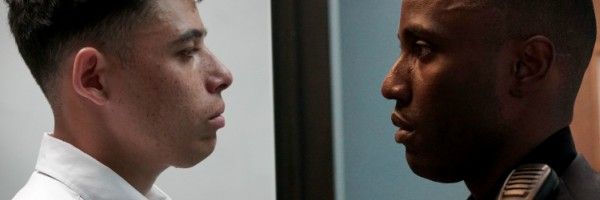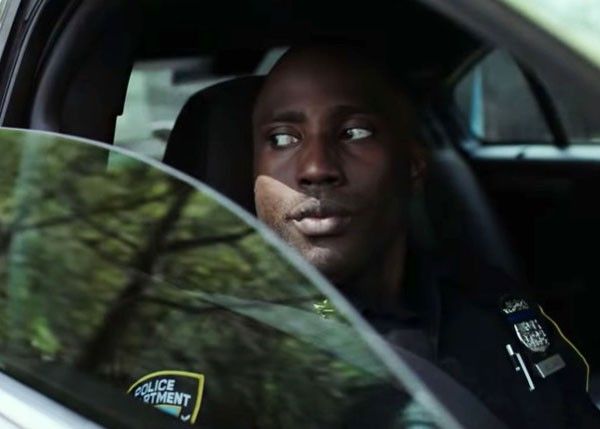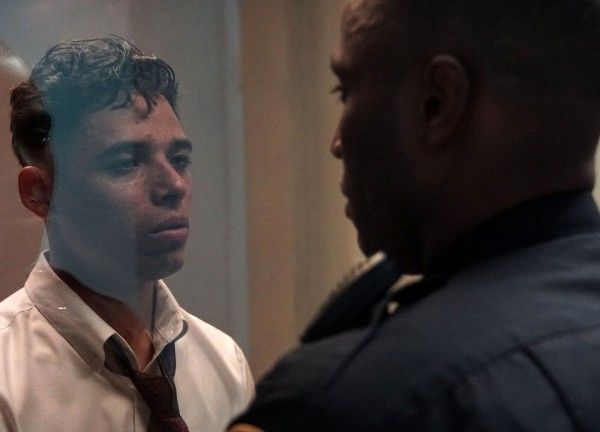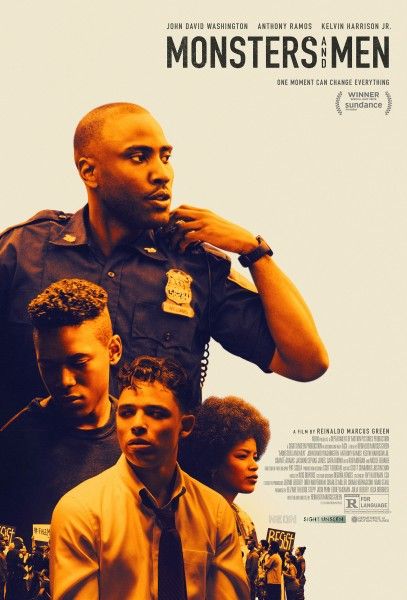From writer/director Reinaldo Marcus Green, the indie drama Monsters and Men takes the all too familiar story of the shooting of an unarmed black man during an altercation with police officers and divides the narrative into three sections – a witness to the incident who captured the violent act on camera (Anthony Ramos), a conflicted cop who is a witness to racism on his own force (John David Washington), and a high school athlete who is inspired to activism by the shooting (Kelvin Harrison Jr.). While the three men don’t know each other, this one incident affects them all so deeply, pushing them to ask questions about truth, justice and the consequences of life-altering actions.
During this 1-on-1 phone interview with Collider, filmmaker Reinaldo Marcus Green talked about the journey of making his first feature film, how Monsters and Men evolved, the triptych structure of the storytelling, the research discovery process, fighting for the right actors vs. the biggest names, and what he’s looking to do next.
Collider: I thought this was such a beautifully told story. It’s the type of story that we’re familiar with, but it’s told in a way that we haven’t really gotten to see from these perspectives before.
REINALDO MARCUS GREEN: Thanks so much.
I know that you’ve said you were at Sundance in 2015 with a short film, when you got into a heated discussion with a police officer you were friends with, and you realized that you guys had different thoughts about this subject. At what point, after having that conversation, did you feel like there could be a movie in there?
GREEN: It didn’t happen right away. The conversation sat with me and just kept coming back, for the six months after the festival. I was thinking about what I wanted to do for a feature, and I was pretty resistant to making my short film into a feature because I knew I would have to stretch it out, and it was gonna be 90 minutes of the same sort of idea that I had accomplished in nine minutes. In thinking about what I wanted to do for a first feature, I decided that I wanted to go back to my roots and do something that’s truthful. I thought about my favorite first features and what’s attainable, that I could do with basically no money. Amores Perros came up as a film that I love, and that got me thinking about the idea of perspective and how I would take that conversation that I had and add something to the short film.
I knew that I could keep the world, and then this triptych structure was born. In investigating my own hesitancy of taking my short film and making a feature, I thought about a way to add to the conversation, rather than subtract from it. We’ve seen so many movies like this, or around it, so I wanted to find the value that I could add to the conversation. That’s what led me down this pathway of, what can I do that can add to that conversation? That’s how the triptych structure was born. We don’t really have triptych movies that focus on black and brown people, so I thought this would be really interesting. It also played on that perspective. So, I started looking at movies, like Amores Perros and The Place Beyond the Pines, to see where and how they transitioned. I tried a lot of different things, and then pulled from my real life to go with it. I went through a process, investigating my own interest level in these characters, each pulled from different people or scenarios in my life, to come up with what you see in the film.
As Dennis (John David Washington), Manny (Anthony Ramos) and Zyric (Kelvin Harrison Jr.) became your three points of view, what did you learn, during the research process of this, that influenced the story or most surprised you?
GREEN: You know that these viewpoints exist, but I was surprised it was so close to home and that it was a friend. My father worked at the Department of Investigations, so I grew up with a lot of police officer friends. In having more conversations with more cops, and really asking the critical questions about how they feel, especially black police officers – my friend, who I had the conversation with, was a white police officer – and then, digging into the black police culture and consulting with a lot of black police officers, and how it’s the same and different, I learned that their situation is even far more complex. It’s even part of the reason why I decided to make Dennis’ character black. My friend was a white police officer, but I thought if I made him white, it was gonna be a black versus white thing. With this, it goes beyond race. We’re talking about policing people’s lives. We’re also talking about culture. That discovery process, especially with the police officers, really going in and doing ride alongs, and I’d never been in a police car before, was different. I grew up an athlete, so Kelvin’s character came with a lot of my own personal issues. I had a lot to pull from personal experiences. Really diving into police culture and getting a taste for it myself, it definitely opened up my eyes a bit to what’s happening.
When I spoke to John David Washington about this film, he told me that you put him through his paces before he got this role. Why did you wait so long to tell him that you were going to cast him, and what was it that made you want to cast him?
GREEN: Actually, I didn’t know John David. I didn’t know his work. I knew he was on (the HBO series) Ballers, and I thought he was cool on that show, but I’d never seen him in a dramatic role. Also, he’s have to play a New York City Police Officer, and I didn’t know if he could authentically pass. He’s a fantastic actor, and we all knew that, but I had to believe him in that role, which is what I was really trying to investigate. I saw how willing he was, with coming to New York. And then, of course, there is the reality of who can finance a movie, which I was presented with, at that time. It wasn’t necessarily up to me, who I could cast. It was like, “Oh, here are four names that could finance that movie,” and I was like, “I don’t know.” There were really big names, too, who really wanted to do the movie, but I thought they were going to overshadow what this movie is about, and that would do a disservice.
I held out for the right person because I didn’t want somebody to distract us from what the movie was really about. So, I was like, “Who knew anybody in Moonlight, before?” The good thing was that John David agreed to come out to spend time with me, unpaid, and I fell in love with him as a person and as a human being. I thought he was fantastic. I think it was the first time that they felt me really standing up for someone for the role. It was actually easier than I thought it would be. It just clicked. I knew he was the guy. I didn’t tell him right away because I needed a series of approvals, but we solidified our relationship. We talked about fathers. We talked about being black. There were so many levels that we went deep down, in just getting to know each other. For two people who didn’t know each other, we were basically living together. You get to know a person. I was very blessed to have that experience with him, and we took a lot of that into the film.
As a first time filmmaker, what’s it even like to go through this journey? What have you learned from this experience that you think will influence and affect what you do, going forward?
GREEN: It’s interesting, I wish I had more moments of levity. It’s heavier than I anticipated, in the sense of making the film, which is just part of sticking to the truth, in my mind. I think just the reality of getting people to enjoy a film is heavy. I definitely learned from that. And I learned from Spike [Lee] that you can make a heavy movie and still have people laugh, and that’s okay. There are definitely some things that I see in the movie, like how do I make these films digestible, in a way that people can consume them on an entertainment level of while still gaining something from it. I hope that people do that. I hope people will walk out and say they enjoyed the movie as a movie. I’m happy with the movie, but things like shot selection, pacing and how those things could be looked at, can always be improved. As a director, you’re watching your stuff and being very critical about it. I loved watching movies, growing up, and I hope to make movies that people can watch, over and over again.
Do you know what’s next for you, as a filmmaker? Have you thought about what the next thing is you might want to do?
GREEN: I just directed the first three episodes of a Netflix television series, called Top Boy. It was around a couple of years ago, and now it’s being produced by Drake. I’m gonna be in the edit for that, starting [in October]. And then, I just came on board, as a director, for a Ridley Scott produced film about Jack Johnson, who was the first heavyweight black boxer in the south, in Galveston, Texas in 1929. That’s just in development, so we’ll see when it happens, but it’s a project that I’m very excited about. And then, I’m quietly developing my own stuff. Whether that will be film or television, I’m not sure. I watch a lot of TV, so I’m not against it, but I feel like I definitely have some movies left in me that I wanna get at. I wanna do something that deals with youth. All of my films lead back to youth and adolescence, whether it’s young teens and the struggles that they’re dealing with, within their community. There will definitely be people that look like me, and some of them will be behind the camera. It’s a little general to say, but I hope to be making some films that tell our story and put more of us on screen.
Would you like to tackle a TV series, where you direct all or most of the episodes?
GREEN: Yeah. I hope that whatever series I do next, all eight or ten episodes will be mine. Cary Fukunaga is a great example, with what he did with True Detective. Being able to expand eight hours of different characters would be a really exciting opportunity and challenge. I’m looking forward to diving into something in that space.
Monsters and Men is now playing in select theaters.




